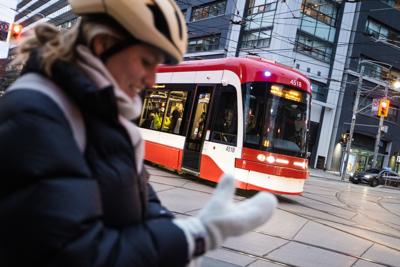Toronto seems to be at a standstill. Transit is increasingly unreliable and not just because construction is throwing service into a state of chaos. A feeling of decline has set in.
Addressing the root causes of our immobility is long overdue. The city can, of course, raise more revenue and reduce costs, but it relies on the legal and financial resources of Queen’s Park and Ottawa to meaningfully improve our transit.
My work in Toronto and Europe inspired the following ideas. They do not represent a full range of perspectives, but can hopefully spur a discussion in this first year of a new political term.
- Bring all facets of transportation together
London, Budapest, Sydney and Vancouver have brought transportation functions under the same roof and leadership. Toronto’s big move would be to bring together transportation planning and delivery, from streets to transit, to parking or even enforcement, with budgets based on outcomes, not modes. It could also take over routine traffic enforcement to align it with mobility outcomes.
- Make a plan
Toronto lacks a multi-modal transportation plan that allocates space and resources toward specific outcomes. We cannot prioritize all road users all at once, everywhere. The Mayor’s Transport Strategy in London is such a plan.
- Clarify accountability for transportation
You might be interested in
It is hard to pinpoint who is accountable for transportation in Toronto. Why not an accountable and dedicated deputy mayor as in Paris, Berlin or London?
- Measure, benchmark and report on performance
To know how we do and progress, we need measurements benchmarked against peer cities on reliability, speed, efficiency and user satisfaction. Results would highlight shortcomings and inform resource allocation. The Swiss government evaluates transit agencies and reports the results, while authorities throughout Europe proactively manage the performance of their contracted public and private operators.
- Prioritize transit
Toronto’s initiatives, such as reserved rights of way on Spadina and King Streets have not reached their potential, and we pay everywhere for transit vehicles to sit in traffic. Transit priority measures and credible enforcement would enhance reliability. Only an outcome-based view of mobility can drive these decisions. Paris created a network of priority bus routes to relieve its subway and New York City installed bus lanes on major avenues in Manhattan, and even created bus-only streets.
- Make transit fares smarter and more affordable
Metropass sales are at 40 per cent of pre-pandemic levels. Transit users balk at paying $156 monthly, or the same as 47 trips. Fare products should meet user needs and generate ridership. Caps, now widespread in Europe and North America, combine flexibility and predictability.
- Manage transportation on streets holistically
Streets are shared, making the case for street and surface transit operations to be managed jointly. Transport for London operates a control centre for both arterial and transit operations and during the reconstruction of metro line 3, Budapest introduced bus priority lanes to speed up replacement buses.
- Look beyond the city’s borders
Thousands of Torontonians face uncoordinated services and fares when crossing municipal boundaries or are even deterred from travelling, resulting in thousands of jobs remaining out of reach. Among large Canadian regions, Toronto alone lacks regional transit co-ordination. A more user-centered approach to fares and services that erases municipal boundaries would build on the upcoming removal of double fares. In German-speaking regions, transit associations or "Verkehrsverbünde" co-ordinate services and fares across modes and operators.
- Place the citizen at the centre
A citizen-focused approach to mobility would finally mean helping Torontonians get where they want to go to meet their needs, reliably and safely, keeping them informed.
- Build consensus to stop the war of words
Transportation culture wars have tended to focus on symbols instead of pragmatism. Cycling is a mode, not a religion, and labour considerations should not prevent regional service co-ordination. It is time to find common ground, and land on solutions.
It is Toronto’s moment. If we follow global best practices and demand more for our investment, we will finally get moving. Why wait?












